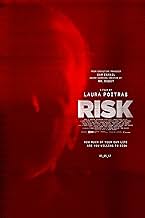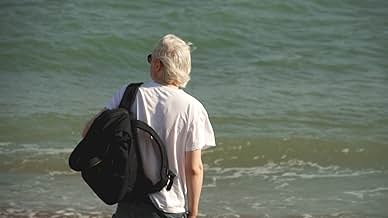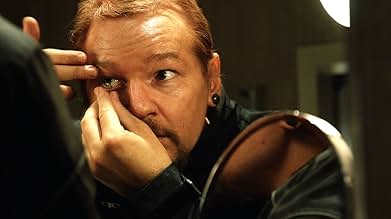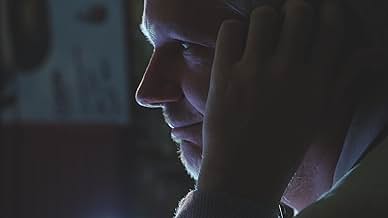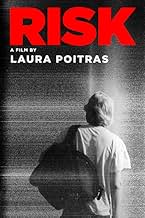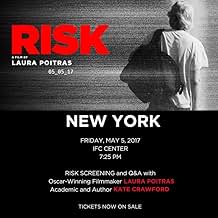IMDb RATING
6.3/10
2.4K
YOUR RATING
The story of WikiLeak's editor-in-chief Julian Assange as seen by documentary filmmaker Laura Poitras.The story of WikiLeak's editor-in-chief Julian Assange as seen by documentary filmmaker Laura Poitras.The story of WikiLeak's editor-in-chief Julian Assange as seen by documentary filmmaker Laura Poitras.
- Awards
- 4 nominations
Laura Poitras
- Self
- (voice)
Louis Bladel
- Self - FBI counterintelligence
- (as Special Agent Louis Bladel)
Hillary Clinton
- Self
- (archive footage)
James Comey
- Self
- (archive footage)
Anderson Cooper
- Self
- (archive sound)
- Director
- Writers
- All cast & crew
- Production, box office & more at IMDbPro
Storyline
Did you know
- TriviaThe WikiLeaks lawyers Margaret Ratner Kunstler, Deborah Hrbek, Renata Avila and Melinda Taylor published an 'opinion piece' in Newsweek on May 17, 2017; WikiLeaks announced on the same day on Twitter that they may sue Laura Poitras: "We are lawyers for WikiLeaks. We are speaking out because we believe that Laura Poitras's film Risk (2016), released in U.S. theaters on May 5 this year, places our clients in legal jeopardy. (...) Our first issue with "Risk" is that the film was edited in New York, where the raw footage can more easily be seized by the U.S. government. By moving the editing location from Berlin to the U.S., Poitras has endangered our clients and reneged on written agreements with WikiLeaks that explicitly forbid her from editing the footage in the United States. (...) Poitras has also violated her unambiguous promise to the subjects of the film that they would have an opportunity to review the film in advance and request changes, and that they could decline to appear if they or their lawyers felt that the movie put them at risk. Had the filmmaker not agreed to these express conditions, WikiLeaks' staff would not have allowed themselves to be filmed in the first place. Despite repeated requests, neither the subjects of the film nor their attorneys were granted a prior viewing of the film that Poitras intended to release in the U.S.. When, along with the general public, we were finally able to view "Risk", we were dismayed to discover that the film released in theaters is a different version, not only from that which premiered at Cannes the year before, but also from the version screened for Julian Assange and his UK counsel at the Ecuadorian Embassy in London. The film viewed in the Embassy just one month prior to its U.S. release was shorn of all narration and omitted numerous new scenes, significantly changing its tenor. That the 'real' film contained these elements was concealed, preventing Assange from exercising his contractual rights. Prior to its initial U.S. release, seven of the participants submitted non-consent forms to the producers advising Poitras and her team that they did not want to appear in the film. Regardless, Poitras went ahead and released it. (...) To convince the audience of her point about the prevalence of sexism, Poitras has marginalized and demeaned a number of women who work for WikiLeaks, choosing instead to give men most of the airtime and leaving scenes depicting the significant contributions of the women WikiLeaks journalists on the cutting room floor. In their place, we now see an intense focus on women taking instructions and throwing off adoring looks. Sarah Harrison, for example, a brilliant journalist and winner of the Willy Brandt prize for "exceptional political courage," who at considerable personal risk helped Edward Snowden obtain political asylum, and who was accurately portrayed as having a central role in WikiLeaks work in the Cannes version, is now depicted as little more than a minion. Exactly what caused this pivot is not entirely clear. (...) The reason for the shift seems to be contained in the newly added voiceover, in which Poitras divulges that she was involved in an intimate relationship with one of the film's primary subjects, award-winning journalist Jacob Appelbaum. Appelbaum appears prominently in Poitras' Citizenfour (2014) as well as in "Risk". Although he does not work for WikiLeaks, Poitras conflates WikiLeaks with the organization he did work for, Tor, and makes him a central focus of the current version of "Risk". The Cannes premiere of "Risk" portrayed Appelbaum in a flattering light and Poitras did not disclose the nature of their relationship at that time. (...) Poitras was criticized after Cannes for appearing to be overly sympathetic to WikiLeaks. Instead of providing us with a more objective portrayal of her subject matter, she has re-framed her story to turn "Risk" into a film by Laura Poitras about Laura Poitras; a rather late coming-of-age story about the filmmaker discovering that there is sexism in her social and professional circles. Instead of a documentary about the abuse of state power and WikiLeaks' important role in exposing it, the emphasis of the film is now to highlight hotly disputed claims about an ex-boyfriend. We have to ask: Why choose this moment in history, when First Amendment and other fundamental rights are under attack, to undermine the credibility of an organization dedicated to government transparency and freedom of the press? (...) "Risk" might win attention for Poitras by pandering to tabloid narratives about its subjects, but it has done a great disservice to her fellow documentarians, and has profoundly betrayed her friends, her colleagues and her journalistic integrity."
- Quotes
Julian Assange: We don't have a problem, you have a problem.
- ConnectionsFeatures Collateral Murder (2010)
Featured review
"We don't have a problem, you have a problem." Julian Assange
As the ever-cool Assange announces to Hillary's campaign that leaks are forthcoming, he is slightly wrong: No one in the WikiLeaks world, on either side, is without problems. For Assange, four years of asylum-imprisonment in the London Ecuador embassy could not be easy; for Hillary, leaked messages and her private use of a server are only the beginnings of her problems.
It's all about info and who commands it—Laura Poitras's doc, Risk, lets us in to the private world of the Australian journalist and programmer Assange, founder of WikiLeaks in 2006, enabler of Robert Snowden, and purveyor of thousands of pages of secret government documents.
Poitras does a remarkable job keeping above the political sides, even admitting at one point that she does not trust Assange. She makes her presence known from voice over, yet rarely pushes an agenda other than entertaining and enlightening her audience.
Poitras gives the audience as much insight as they could hope for with a subject as opaque as might be expected: "What does it matter how I feel?" (Assange) Brief moments with Lady Gaga and Daniel Ellsberg provide humorous respite from the monotony of Assange's imprisonment.
Assange's answer as to why he does WikiLeaks is as evasive as his answers to most questions. Deflecting accusations of sexual harassment is pure Assange: He gently accuses hardcore feminists of a conspiracy against him. Sweden still wants to interview him about the charges.
Whereas in Citizenfour, Poitras let Snowden come off as a hero, she does not cut the low-key Risk in a way to make Assange saintly: "The risk of inaction is extremely high," he says in a reflection of his activist mentality and the title of the film.
He is smooth and careful, partly right and partly wrong, just like this documentary.
As the ever-cool Assange announces to Hillary's campaign that leaks are forthcoming, he is slightly wrong: No one in the WikiLeaks world, on either side, is without problems. For Assange, four years of asylum-imprisonment in the London Ecuador embassy could not be easy; for Hillary, leaked messages and her private use of a server are only the beginnings of her problems.
It's all about info and who commands it—Laura Poitras's doc, Risk, lets us in to the private world of the Australian journalist and programmer Assange, founder of WikiLeaks in 2006, enabler of Robert Snowden, and purveyor of thousands of pages of secret government documents.
Poitras does a remarkable job keeping above the political sides, even admitting at one point that she does not trust Assange. She makes her presence known from voice over, yet rarely pushes an agenda other than entertaining and enlightening her audience.
Poitras gives the audience as much insight as they could hope for with a subject as opaque as might be expected: "What does it matter how I feel?" (Assange) Brief moments with Lady Gaga and Daniel Ellsberg provide humorous respite from the monotony of Assange's imprisonment.
Assange's answer as to why he does WikiLeaks is as evasive as his answers to most questions. Deflecting accusations of sexual harassment is pure Assange: He gently accuses hardcore feminists of a conspiracy against him. Sweden still wants to interview him about the charges.
Whereas in Citizenfour, Poitras let Snowden come off as a hero, she does not cut the low-key Risk in a way to make Assange saintly: "The risk of inaction is extremely high," he says in a reflection of his activist mentality and the title of the film.
He is smooth and careful, partly right and partly wrong, just like this documentary.
- JohnDeSando
- May 8, 2017
- Permalink
- How long is Risk?Powered by Alexa
Details
- Release date
- Countries of origin
- Official sites
- Languages
- Also known as
- Риск
- Filming locations
- Production companies
- See more company credits at IMDbPro
Box office
- Gross US & Canada
- $200,219
- Opening weekend US & Canada
- $76,327
- May 7, 2017
- Gross worldwide
- $214,669
Contribute to this page
Suggest an edit or add missing content




